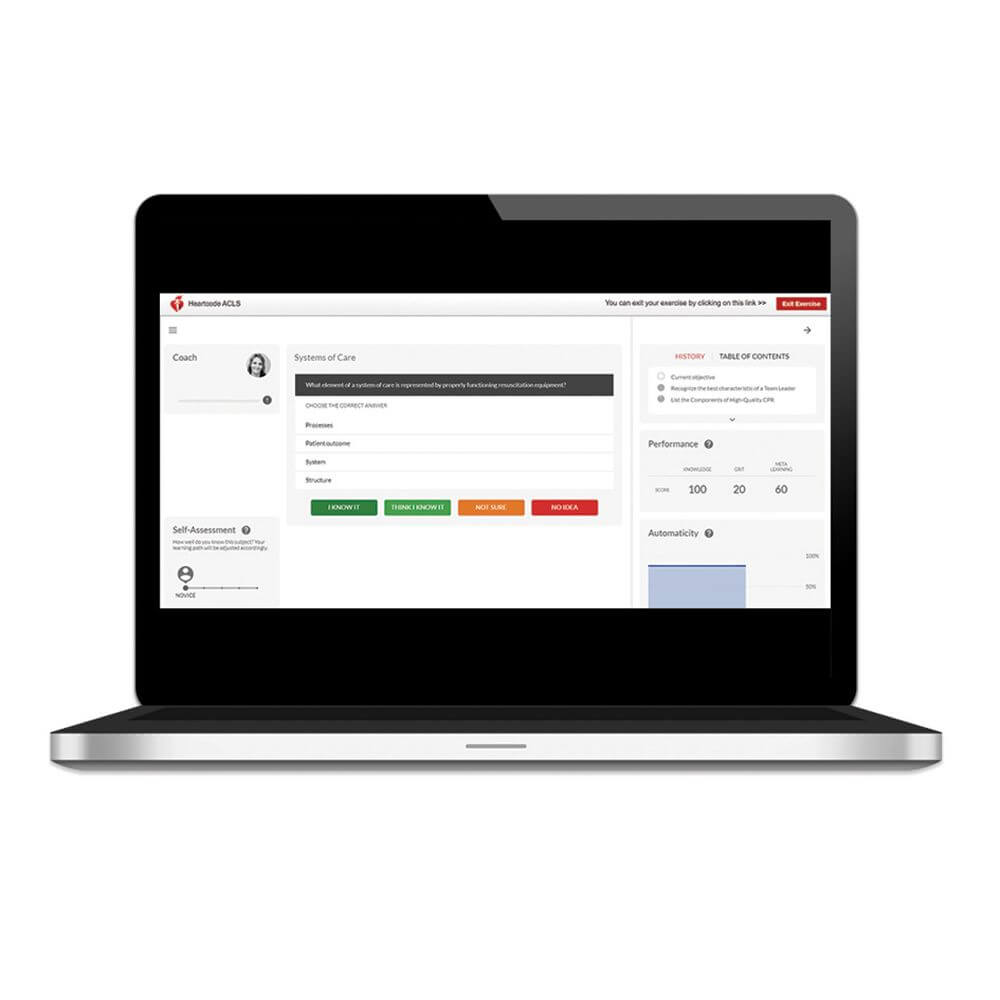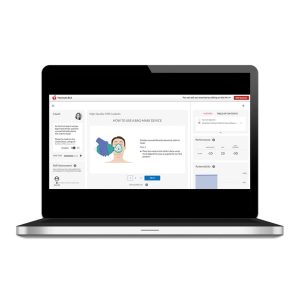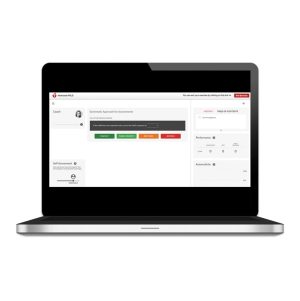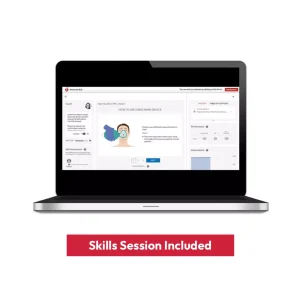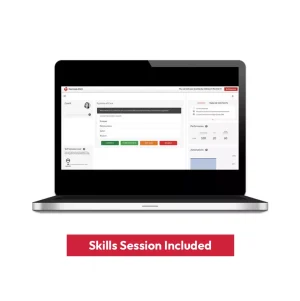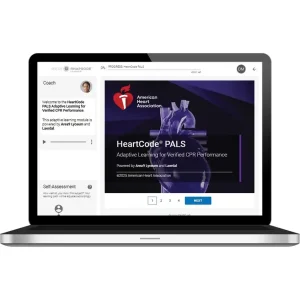Skills session is not included in the price.
HeartCode ACLS is the AHA’s blended learning delivery method for the AHA’s ACLS Course. HeartCode blended learning delivers quality resuscitation education regardless of where providers are located and gives them more control to complete the course at their own pace.
Providers first complete the online portion of HeartCode ACLS and then complete a hands-on skills session with an AHA ACLS Instructor or a HeartCode compatible manikin.
Access to the ACLS Provider Manual eBook (20-3100) is included with HeartCode ACLS. You will be able to access the Provider Manual from within the course.
This product has been updated with new science from the 2020 Guidelines for CPR and ECC and replaces the previous version (15-1407).
How does the 2020 Guidelines version of HeartCode differ from the 2015 Guidelines version of HeartCode?
The 2020 Guidelines HeartCode uses a personalized adaptive algorithm that sets students on the most efficient path to mastery. Students follow a continuously adapting learning path that is personalized by their own inputs: their performance, and their self- reported confidence level related to each probing question. The course content is presented in the form of self-directed learning content, probing questions, and Cognitive Assessment Activities (CAAs).
Continuing Education Information
- HeartCode Advanced Cardiovascular Life Support (ACLS) Online Course; Enduring Web course
- Original Release Date: 10/21/2020
- Last Review Date: October 2023
- Termination Date: 10/19/2026
Description
HeartCode ACLS Online is the online portion of ACLS blended learning that will prepare students for hands-on practice and testing of skills. It uses a personalized adaptive algorithm that sets learners on the most efficient path to ACLS mastery. Students follow a continuously adapting learning path that is personalized by their own inputs: their performance, and their self- reported confidence level related to each probe. The course content is presented in the form of self-directed learning content, probes, and Cognitive Assessment Activities.
Learning Objectives
At the conclusion, participants should be able to:
1. Define systems of care
2. Apply the BLS, Primary, and Secondary Assessments sequence for a systematic evaluation of adult patients
3. Discuss how the use of a rapid response team (RRT) or medical emergency team (MET) may improve patient outcomes
4. Discuss early recognition and management of ACS, including appropriate disposition
5. Discuss early recognition and management of stroke, including appropriate disposition
6. Recognize bradycardias and tachycardias that may result in cardiac arrest or complicate resuscitation outcome
7. Perform early management of bradycardias and tachycardias that may result in cardiac arrest or complicate resuscitation outcome
8. Model effective communication as a member or leader of a high-performance team
9. Recognize the impact of team dynamics on overall team performance
10. Recognize respiratory arrest
11. Perform early management of respiratory arrest
12. Recognize cardiac arrest
13. Perform prompt, high-quality BLS including prioritizing early chest compressions and integrating early automated external defibrillator (AED) use
14. Perform early management of cardiac arrest until termination of resuscitation or transfer of care, including immediate post–cardiac arrest care
15. Evaluate resuscitative efforts during a cardiac arrest through continuous assessment of CPR quality, monitoring the patient’s physiologic response, and delivering real-time feedback to the team
Accreditation Terms
- Joint Accreditation: 10/20/2023 – 10/19/2026
- CAPCE: 10/20/2023 – 10/19/2026
- AARC: 10/21/2024 – 10/21/2025
Accreditation Statements
Joint Accreditation Statements
In support of improving patient care, this activity has been planned and implemented by The American Heart Association. The American Heart Association is jointly accredited by the Accreditation Council for Continuing Medical Education (ACCME), the Accreditation Council for Pharmacy Education (ACPE), and the American Nurses Credentialing Center (ANCC), to provide continuing education for the healthcare team.
AMA Credit Designation Statement – Physicians
The American Heart Association designates this activity for a maximum of 2.00 AMA PRA Category 1 Credits™. Physicians should claim only the credit commensurate with the extent of their participation in the activity.
AAPA Credit Acceptance Statement – Physician Assistants
AAPA accepts certificates of participation for educational activities certified for AMA PRA Category 1 Credit™ from organizations accredited by ACCME or a recognized state medical society. Physician assistants may receive a maximum of 2.00 hours of Category I credit for completing this program.
AANP Credit Acceptance Statement – Nurse Practitioners
American Academy of Nurse Practitioners (AANP) accepts AMA PRA Category 1 CreditTM from organizations accredited by the ACCME.
ANCC Credit Designation Statement – Nurses
The maximum number of hours awarded for this CE activity is 2.00 contact hours.
ACPE Credit Designation Statement – Pharmacists
ACPE Credit: 2.75 Contact Hours. Universal Program Number: JA0000134-0000-23-135-H04-P
Continuing Education Accreditation – Emergency Medical Services
This continuing education activity is approved by the American Heart Association, an organization accredited by the Commission on Accreditation of Pre-Hospital Continuing Education (CAPCE), for 3.00 Advanced CEHs, activity number 23-AMHA-F4-0044.
By claiming CAPCE credit, the claimant acknowledges the following: I understand that the American Heart Association as a requirement of CAPCE accreditation will submit a record of my course completions to the CAPCE AMS. I further understand that my course completion records may be accessed by or shared with such regulators as state EMS offices, training officers, and NREMT on a password-protected, need-to-know basis. In addition, I understand that I may review my record of CAPCE-accredited course completions by contacting CAPCE.
AARC Credit Statement – Respiratory Therapist
This non-traditional program has been approved for 2.50 contact hour(s) Continuing Respiratory Care Education (CRCE) credit by the American Association for Respiratory Care, 9425 N. MacArthur Blvd. Suite 100, Irving, TX 75063.
Course# 192704000
Participation and Successful Completion
I. Learners will register through RQI 1Stop or related LMS
II. Attendees will claim credit on a variety of online LMSs
Successful completion of this CE activity includes the following:
1. Complete all portions of the online course
2. Complete the course evaluation
3. Print the Certificate/Statement of Credit
Disclosure Statement
All persons in a position to control educational content of a CE activity provided by the American Heart Association must disclose to the audience all financial relationships with ineligible companies whose primary business is producing, marketing, selling, re-selling, or distributing healthcare products used by or on patients. The presence or absence of all financial relationships will be disclosed to the audience in activity materials. All unlabeled/unapproved uses of drugs or devices discussed will also be disclosed to the audience. All relevant financial relationships have been mitigated prior to the commencement of the activity.
The following authors/faculty have declared NO financial interest(s) and/or affiliations:
Kenneth Navarro, MEd, LP
Mauricio G. Cohen, MD
Edward C. Jauch, MD, MS
Susan Morris, RN
Brian K. Walsh, PhD, RRT
Erik S. Soderberg, MS
Amber Rodriguez, PhD
Comilla Sasson, MD, PhD
Deanna Rodriguez, MBA
Lauren Sanderson, MS
This list represents the relationships that may be perceived as actual or reasonable conflicts of interest as reported on the Disclosure Questionnaire, which all AHA volunteers are required to complete and submit. The focus is on relevant financial relationships with commercial interests in the 24-month period preceding the time that the individual is being asked to assume a role controlling content:
Sallie Johnson, PharmD, BCPS—Penn State Hershey Medical Center (Employment)
Elizabeth Sinz, MD, MEd—Sinz Healthcare Education Solutions, LLC (Other—Sole Proprietor)
Target Audiences
1. EMS
2. Physicians
3. Physician Assistants
4. Nurse Practitioners
5. Nurses
6. Pharmacists
7. Respiratory Therapists
ADA Statement
The American Heart Association does not provide advice to Training Centers on ADA requirements or any other laws, rules or regulations. Training Centers must determine accommodations necessary to comply with applicable laws. AHA recommends consultation with legal counsel.
Core curriculum change requests for accessibility purposes must be scientifically based and approved in advance in writing by the AHA ECC Science & Product Development department; otherwise a student must be able to successfully perform all course requirements (skills and written tests as indicated) to receive a course completion card. Reasonable accommodations may be made, such as placing the manikin on a table at the height necessary for wheelchair- bound individuals. However the skills must be satisfactorily completed during the testing sessions.
Guidelines for accommodating students with special needs or disabilities may be found in the Program Administration Manual.
Audience
This course is designed for healthcare professionals who direct or manage cardiopulmonary arrest or other cardiovascular emergencies; personnel in emergency response, emergency medicine, intensive care, and critical care units; physicians, nurses, and paramedics; and others who need an ACLS course completion card for job or other requirements.
ISBN: 978-1-61669-787-7
